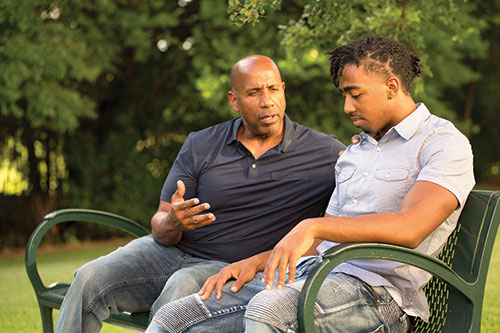Adolescent Substance Use: Warning Signs and Strategies
 Navigating through adolescence is challenging, both for parents and their teens. Recognizing potential dangers and talking about them as a family is one way to head off problems, especially those that pose negative physical and emotional consequences that can threaten a family's stability and well-being.
Navigating through adolescence is challenging, both for parents and their teens. Recognizing potential dangers and talking about them as a family is one way to head off problems, especially those that pose negative physical and emotional consequences that can threaten a family's stability and well-being.
One of those dangers is substance use. To be fully informed and better equipped to deal with this issue, parents have to learn as much as they can, especially when it comes to identifying the signs and symptoms of drug use.
Possible Warning Signs
While the following list includes behaviors that a typical developing teen might display, they also could be tip-offs to possible substance use:
- Drastic changes in mood for no apparent reason
- Abnormal sustained fatigue or bursts of energy
- Changes in sleep or eating patterns
- Decline in personal hygiene
- Withdrawal from family activities
- Refusal to follow house rules (especially if this has not been a problem)
- New friends or a loss of interest in activities the teen has liked in the past
- Decline in school performance and/or attendance
- Loss of a job or being written up for irresponsible behaviors at work
- Aggressive behavior
- Unaccounted blocks of time
- Lying about whereabouts or events
- Losing money or possessions without explanation
- Possession of drug paraphernalia or materials with drug references
- Getting in trouble with the law
 Tips and Tools for Prevention
Tips and Tools for Prevention
Adolescents say their reasons for turning to drugs include trying to fit in, doing what other kids are doing, boredom, curiosity, escaping pain and the thrill of taking a risk. Talking with your adolescent early – before he or she gets involved with drugs – about positive ways to deal with these challenges or difficulties not only opens the lines of communication but also gives your child skills for solving problems and making better decisions. Here are some parenting tips for doing that:
-
Get involved and stay involved with your adolescent. That can include enjoying activities together whenever possible and just talking.
-
Know what your adolescent is doing by having frequent conversations.
-
Get to know your child's friends and the parents of their friends, and don't be afraid to check in with those parents.
-
Explain to your teen the specific behavioral expectations you have for him or her. Talk with your teen often to reinforce those expectations.
-
Set house rules, explain them and enforce them consistently and fairly.
-
Be a parent, not a pal.
-
Talk with your adolescent about risky or dangerous situations and the best ways to handle them.
-
Stay informed about current trends for teens.
-
Constantly show your adolescent you care by:
- Saying “I love you."
- Balancing correction and praise for negative and positive behaviors.
- Listening to what they have to say without interrupting and giving them your full attention during a conversation.
Getting Help
If you feel your adolescent child and/or your family needs help with a substance use problem, please contact the Boys Town National Hotline® at 800-448-3000. Trained Crisis Counselors are on duty 24/7 and can usually provide referrals to professional help in your area.
Download Printable Version
Kid Tips;Common Behavioral Concerns
